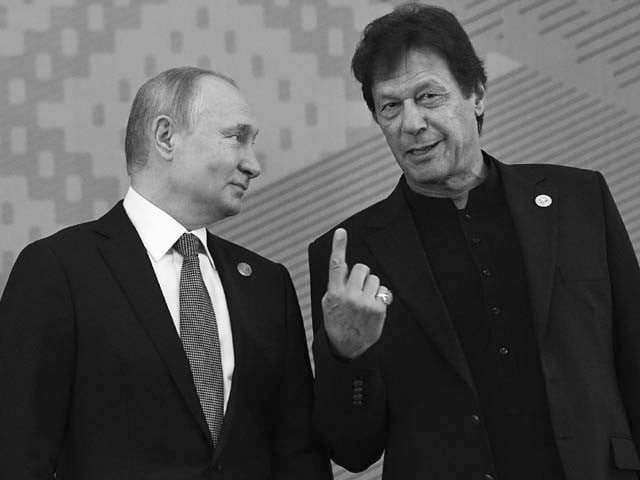The Russian foreign minister’s recently concluded visit to South Asia heralds a new era in Russia’s South Asian policy. Russia and India are strategic partners; while Moscow was once Pakistan’s predominant security concern. But the geostrategic developments in the last decade or so have resulted in a global strategic realignment. A change in Russia’s South Asian policy is also visible. New alliances are being developed which would likely have serious implications for regional security and strategic stability. Before regional security implications are analysed, it is important to assess what has compelled this change in regional strategic orientation. To deconstruct the change in Russia’s South Asian policy, two important components require analysis.
First, there is a realisation in Moscow that New Delhi is getting closer to Washington and that too at the expense of Russia-India relations. The National Security Strategy of 2018 declared Russia a revisionist state which presents a major national security threat to the United States (US). The Indian decision to develop a strategic partnership with the US has altered the regional strategic calculus and its relations with Russia. As the US and India realign their strategic objectives, they are increasingly at odds with that of Moscow.
A new regional strategic nexus is under development. India and Russia used to have mutual interests and objectives in the region, but now New Delhi is a member of the Quad, and has a designated role as a regional bulwark against the rise of China. New Delhi’s overtures to Washington haven’t gone down well with Moscow. It has led policymakers in the Kremlin to expand their diplomatic outreach in the region in order to find new partners, which leads to the second component.
Russia and Pakistan share a murky history. Pakistan is Washington’s oldest ally in the region. It was once a regional bulwark against Moscow’s supposed expansionist designs. However, the times have changed now. The US and Pakistan have been gradually drifting apart for some time; while Pakistan and Russia are increasingly finding points of convergence of interests. The recent trip to South Asia by the Russian Foreign Minister Sergey Lavrov laid down the holistic vision for the future of Russia-Pakistan relations.
Top of the list is their mutual interest in achieving a peaceful end to the Afghan war. Both Islamabad and Moscow are apprehensive of the US endgame in Afghanistan. They are in agreement that the peace process must be Afghan-led. To facilitate this, both Islamabad and Moscow have provided the use of their good offices. Biden’s decision to withdraw US troops by September 11, 2021, would leave a massive security vacuum, and the regional powers will be required to step in to ensure a peaceful conclusion to the intra-Afghan dialogue. Hence, on his recent visit, Foreign Minister Lavrov was accompanied by the Russian President’s Special Envoy for Afghanistan Ambassador Zamir Kabulov.
Counterterrorism is another area of mutual interest. Both Russia and Pakistan find the prospect of terrorism proliferation in post-withdrawal Afghanistan a national security threat. Foreign Minister Lavrov offered Pakistan access to special military equipment to combat this threat. Both Islamabad and Moscow find it in their interest to ensure that terrorist organisations do not find any space in Afghanistan.
Afghanistan is not the only point of convergence for Russia and Pakistan. There has been a shift in Pakistan’s priorities from geo-strategic to geo-economics. Pakistan wants to develop itself as the regional connectivity hub and requires technical expertise and investments. Russia possesses the requisite technical expertise to help Pakistan strengthen its economic base. However, the sanctions placed by the US would likely make things a bit tricky to execute.
The return of the great power competition means that new alliances are being forged. The change in Russia’s South Asian policy of rebalancing between India and Pakistan would have major security implications for the region. This change is primarily down to the fact that India, the erstwhile Russian ally in the region, is now part of the US led alliance.
The Indian media is reporting that New Delhi is worried about the developing relations between Russia and Pakistan. The desire to further relations, as outlined by the foreign minister’s visit, is overarching in nature and rightly worrisome for India. A core component of Narendra Modi’s foreign policy was to diplomatically isolate Pakistan. However, Pakistan’s strengthening of diplomatic ties with India’s historical ally is a failure of that facet of Indian foreign policy.
However, by no means can it be concluded that developing Pak-Russian relations would have a major negative impact on Russia-India relations. Russia-Pakistan relations would evolve slowly given the historical baggage and current geostrategic environment, but they would continue to evolve. On the other hand, as India and the US further institutionalise their objectives and interest, it would force India to divest from its relations with Russia.
The regional security architecture is rapidly evolving and it has compelled the regional powers to realign their objectives and interests. The emergence of new alliances is reshaping the regional strategic orientation, and this has compelled Russia to review its South Asia policy and develop a balancing act between Pakistan and India.



COMMENTS
Comments are moderated and generally will be posted if they are on-topic and not abusive.
For more information, please see our Comments FAQ